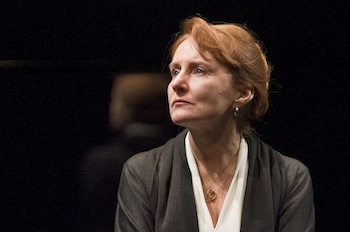Joan Didion’s heartbreakingly hilarious grief memoir comes alive onstage

“Life changes fast. Life changes in an instant. You sit down for dinner and life as you know it ends. The question of self-pity.” So begins The Year of Magical Thinking, a grief memoir written by author and journalist Joan Didion at the end of what had been for her a terrible year that began on Dec. 30, 2003, when her husband’s heart seized and left her a widow. Soon after, her adult daughter undergoes emergency neurosurgery and spends months hovering just above death. Just before the book was published, her daughter died.
The Year of Magical Thinking, Didion wrote, is her “attempt to make sense of the period that followed, weeks and then months that cut loose any fixed idea I ever had about…the ways in which people do and do not deal with the fact that life ends, about the shallowness of sanity, about life itself.” Magical thinking is how she defines the strange-yet-comforting thought process she engaged in for that first unbearable year: if she thought the right thoughts and performed the right actions, the deaths might not have happened at all (if she throws away his shoes, he won’t come back. The New York Times obituary is hard to avoid, but maybe if the LA Times doesn’t find out…is he even dead in that time zone?)
Didion is one of the founders of new journalism, joining the likes of Hunter S. Thompson and Tom Wolfe: they use literary devices traditionally employed by fiction writers to tell non-fiction stories. As result, the book is raw emotion, so specific as to be universal: Vanessa Redgrave, while playing Didion in a 2007 Broadway play based on the novel, lost her own daughter, Natasha Richardson, in a skiing accident in Quebec.
Now, Canada’s Seana McKenna has taken on the heady role of bereaved widow in Belfry Theatre and Tarragon Theatre‘s adaption of the book, albeit an a-typical widow infused with Didion’s twisted sense of irony and self-effacing humour. It’s a big role – 85 minutes alone on sparsely decorated stage, featuring a continuous monologue that includes snippets from decades and in some cases centuries-old poetry and literature that Didion clung to through the hardest days. McKenna, switching between witty asides and choked, tear-rimmed confessions, oozes pure Didion. The audience sat in rapt silence through most of the play, but McKenna/Didion brings us laugh-out-loud lines amidst some of the most heartbreaking scenes — you almost feel guilty for laughing. But you get the sense that laughter is what Didion wants — that this business of grief in the new millennium is entirely too PC to do anybody any real good.
Didion describes her grief as a vortex: she must carefully navigate her own thoughts to avoid triggering the waves of grief that came with memories of her husband or daughter. No easy task considering the pair had been married 40 years – now, once-unmemorable places become heavy with meaning. She tries to convince herself that death has happened to them, not her, but self-pity is, after all, the most human of traits. She delved into grief literature, wondering when death became such a private affair — when did mourning become shameful? Why do we praise survivors for their “strength”, which means showing no emotion at all?
Didion lovers will appreciate that the play goes beyond what was written in the book — the best lines are there, surely (“I love you more than one more day”, “Grief turns out to be a place none of us know until we reach it.”) but the script gives more insight into the so-called lessons learned. Didion was profiled earlier this year in a great piece by the Toronto Star’s Richard Ouzounian: she tells him that she didn’t find god — indeed, there isn’t one deity mentioned in the entire novel, or the play – nor was there a silver lining to be uncovered, and unknown strength to be found. This ain’t no Hollywood ending.
